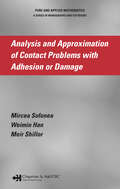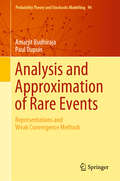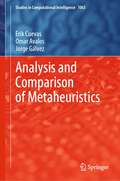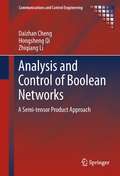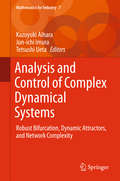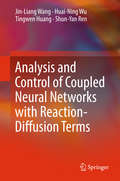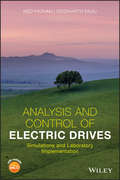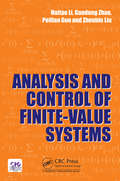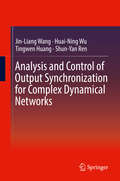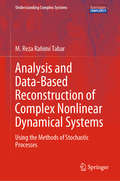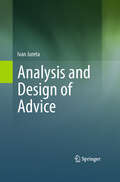- Table View
- List View
Analysis and Application of Analog Electronic Circuits to Biomedical Instrumentation (Biomedical Engineering Ser.)
by Robert B. NorthropAnalysis and Application of Analog Electronic Circuits to Biomedical Instrumentation, Second Edition helps biomedical engineers understand the basic analog electronic circuits used for signal conditioning in biomedical instruments. It explains the function and design of signal conditioning systems using analog ICs-the circuits that enable ECG, EEG,
Analysis and Application of Natural Language and Speech Processing (Signals and Communication Technology)
by Mourad AbbasThis book presents recent advances in NLP and speech technology, a topic attracting increasing interest in a variety of fields through its myriad applications, such as the demand for speech guided touchless technology during the Covid-19 pandemic. The authors present results of recent experimental research that provides contributions and solutions to different issues related to speech technology and speech in industry. Technologies include natural language processing, automatic speech recognition (for under-resourced dialects) and speech synthesis that are useful for applications such as intelligent virtual assistants, among others. Applications cover areas such as sentiment analysis and opinion mining, Arabic named entity recognition, and language modelling. This book is relevant for anyone interested in the latest in language and speech technology.
Analysis and Applied Mathematics: Extended Abstracts of the 2022 Joint Seminar (Trends in Mathematics #6)
by Michael Ruzhansky Makhmud A. Sadybekov Allaberen AshyralyevThis book presents extended abstracts of the Analysis and Applied Mathematics seminar organized jointly by Bahçeşehir University, Istanbul, Turkey, Ghent Analysis & PDE Center, Ghent University, Ghent, Belgium and the Institute Mathematics & Math. Modeling, Almaty, Kazakhstan. The book is of value to professional mathematicians as well as advanced students in the fields of analysis and applied mathematics. The goal of the seminar is to provide a forum for researchers and scientists from different regions to communicate their recent developments and to present their original results in various fields of analysis and applied mathematics. All of the articles contain new results and are peer-reviewed. The volume reflects the latest developments in the area of analysis and applied mathematics and their interdisciplinary applications.
Analysis and Approximation of Contact Problems with Adhesion or Damage (Chapman & Hall/CRC Pure and Applied Mathematics)
by Mircea Sofonea Weimin Han Meir ShillorResearch into contact problems continues to produce a rapidly growing body of knowledge. Recognizing the need for a single, concise source of information on models and analysis of contact problems, accomplished experts Sofonea, Han, and Shillor carefully selected several models and thoroughly study them in Analysis and Approximation of Contact P
Analysis and Approximation of Rare Events: Representations and Weak Convergence Methods (Probability Theory and Stochastic Modelling #94)
by Amarjit Budhiraja Paul DupuisThis book presents broadly applicable methods for the large deviation and moderate deviation analysis of discrete and continuous time stochastic systems. A feature of the book is the systematic use of variational representations for quantities of interest such as normalized logarithms of probabilities and expected values. By characterizing a large deviation principle in terms of Laplace asymptotics, one converts the proof of large deviation limits into the convergence of variational representations. These features are illustrated though their application to a broad range of discrete and continuous time models, including stochastic partial differential equations, processes with discontinuous statistics, occupancy models, and many others. The tools used in the large deviation analysis also turn out to be useful in understanding Monte Carlo schemes for the numerical approximation of the same probabilities and expected values. This connection is illustrated through the design and analysis of importance sampling and splitting schemes for rare event estimation. The book assumes a solid background in weak convergence of probability measures and stochastic analysis, and is suitable for advanced graduate students, postdocs and researchers.
Analysis and Classification of EEG Signals for Brain–Computer Interfaces (Studies in Computational Intelligence #852)
by Szczepan PaszkielThis book addresses the problem of EEG signal analysis and the need to classify it for practical use in many sample implementations of brain–computer interfaces. In addition, it offers a wealth of information, ranging from the description of data acquisition methods in the field of human brain work, to the use of Moore–Penrose pseudo inversion to reconstruct the EEG signal and the LORETA method to locate sources of EEG signal generation for the needs of BCI technology. In turn, the book explores the use of neural networks for the classification of changes in the EEG signal based on facial expressions. Further topics touch on machine learning, deep learning, and neural networks. The book also includes dedicated implementation chapters on the use of brain–computer technology in the field of mobile robot control based on Python and the LabVIEW environment. In closing, it discusses the problem of the correlation between brain–computer technology and virtual reality technology.
Analysis and Comparison of Metaheuristics (Studies in Computational Intelligence #1063)
by Erik Cuevas Jorge Gálvez Omar AvalosThis book presents a comparative perspective of current metaheuristic developments, which have proved to be effective in their application to several complex problems. The study of biological and social entities such as animals, humans, or insects that manifest a cooperative behavior has produced several computational models in metaheuristic methods. Although these schemes emulate very different processes or systems, the rules used to model individual behavior are very similar. Under such conditions, it is not clear to identify which are the advantages or disadvantages of each metaheuristic technique. The book is compiled from a teaching perspective. For this reason, the book is primarily intended for undergraduate and postgraduate students of Science, Electrical Engineering, or Computational Mathematics. It is appropriate for courses such as Artificial Intelligence, Electrical Engineering, Evolutionary Computation. The book is also useful for researchers from the evolutionary and engineering communities. Likewise, engineer practitioners, who are not familiar with metaheuristic computation concepts, will appreciate that the techniques discussed are beyond simple theoretical tools since they have been adapted to solve significant problems that commonly arise in engineering areas.
Analysis and Compensation of Kinetic Friction in Robotic and Mechatronic Control Systems
by Michael RudermanAnalysis and Compensation of Kinetic Friction in Robotic and Mechatronic Control Systems comprehensively covers kinetic friction in a robotics, mechatronics, and control engineering context. Providing the theory behind kinetic friction, as well as compensation methods and practical solutions, the text is a key companion to studying different control systems. Beginning with a clear introduction to the subject, the book goes on to include three main facets of kinetic friction, starting with phenomena of kinetic friction in drives. This chapter explains friction interfaces and friction effects. Following from this, the next chapter looks at motion dynamics with friction, which introduces dynamic system equations and focuses on both energy balance and dissipation. Finally, the book looks at compensation of friction in motion control, which summarises key compensation methods in controlled mechanical systems. Introducing various basic feedback control methods, including observer-based methods to compensate for kinetic friction, the text provides practical information that can be used in a wide variety of contexts not specific to particular systems or applications. This book will be of interest to students and industry workers in the field of robotics, mechanical systems and control engineering.
Analysis and Control for Fractional-order Systems
by Yonggui Kao Yue Cao Changhong Wang Hongwei XiaThis book focuses on the applications of various types of fractional-order differential equations. The authors present their latest research results. This book for the first time introduces the concept of general fractional chaotic systems and their synchronisation, investigates the synchronisation of a fractional coupled reaction-diffusion system using a sliding mode control approach, and considers the impacts of fear and prey escape on a fractional-order prey-predator system with Beddington-DeAngelis functional response. Authors believe that these recent research results can promote the applications of fractional-order differential equations in diverse areas. The book will be attractive to researchers in various fields of mathematics, biomathematics and engineering. Graduate students in related fields may also find this book useful.
Analysis and Control of Boolean Networks: A Semi-tensor Product Approach (Communications and Control Engineering)
by Hongsheng Qi Daizhan Cheng Zhiqiang LiAnalysis and Control of Boolean Networks presents a systematic new approach to the investigation of Boolean control networks. The fundamental tool in this approach is a novel matrix product called the semi-tensor product (STP). Using the STP, a logical function can be expressed as a conventional discrete-time linear system. In the light of this linear expression, certain major issues concerning Boolean network topology - fixed points, cycles, transient times and basins of attractors - can be easily revealed by a set of formulae. This framework renders the state-space approach to dynamic control systems applicable to Boolean control networks. The bilinear-systemic representation of a Boolean control network makes it possible to investigate basic control problems including controllability, observability, stabilization, disturbance decoupling etc.
Analysis and Control of Complex Dynamical Systems: Robust Bifurcation, Dynamic Attractors, and Network Complexity (Mathematics for Industry #7)
by Tetsushi Ueta Kazuyuki Aihara Jun-Ichi ImuraThis book is the first to report on theoretical breakthroughs on control of complex dynamical systems developed by collaborative researchers in the two fields of dynamical systems theory and control theory. As well, its basic point of view is of three kinds of complexity: bifurcation phenomena subject to model uncertainty, complex behavior including periodic/quasi-periodic orbits as well as chaotic orbits, and network complexity emerging from dynamical interactions between subsystems. Analysis and Control of Complex Dynamical Systems offers a valuable resource for mathematicians, physicists, and biophysicists, as well as for researchers in nonlinear science and control engineering, allowing them to develop a better fundamental understanding of the analysis and control synthesis of such complex systems.
Analysis and Control of Coupled Neural Networks with Reaction-Diffusion Terms
by Tingwen Huang Jin-Liang Wang Huai-Ning Wu Shun-Yan RenThis book introduces selected recent findings on the analysis and control of dynamical behaviors for coupled reaction-diffusion neural networks. It presents novel research ideas and essential definitions concerning coupled reaction-diffusion neural networks, such as passivity, adaptive coupling, spatial diffusion coupling, and the relationship between synchronization and output strict passivity. Further, it gathers research results previously published in many flagship journals, presenting them in a unified form. As such, the book will be of interest to all university researchers and graduate students in Engineering and Mathematics who wish to study the dynamical behaviors of coupled reaction-diffusion neural networks.
Analysis and Control of Electric Drives: Simulations and Laboratory Implementation
by Ned Mohan Siddharth RajuA guide to drives essential to electric vehicles, wind turbines, and other motor-driven systems Analysis and Control of Electric Drives is a practical and comprehensive text that offers a clear understanding of electric drives and their industrial applications in the real-world including electric vehicles and wind turbines. The authors—noted experts on the topic—review the basic knowledge needed to understand electric drives and include the pertinent material that examines DC and AC machines in steady state using a unique physics-based approach. The book also analyzes electric machine operation under dynamic conditions, assisted by Space Vectors. The book is filled with illustrative examples and includes information on electric machines with Interior Permanent Magnets. To enhance learning, the book contains end-of-chapter problems and all topics covered use computer simulations with MATLAB Simulink® and Sciamble® Workbench software that is available free online for educational purposes. This important book: Explores additional topics such as electric machines with Interior Permanent Magnets Includes multiple examples and end-of-chapter homework problems Provides simulations made using MATLAB Simulink® and Sciamble® Workbench, free software for educational purposes Contains helpful presentation slides and Solutions Manual for Instructors; simulation files are available on the associated website for easy implementation A unique feature of this book is that the simulations in Sciamble® Workbench software can seamlessly be used to control experiments in a hardware laboratory Written for undergraduate and graduate students, Analysis and Control of Electric Drives is an essential guide to understanding electric vehicles, wind turbines, and increased efficiency of motor-driven systems.
Analysis and Control of Finite-Valued Systems
by Guodong Zhao Haitao Li Peilian GuoA comprehensive work in finite-value systems that covers the latest achievements using the semi-tensor product method, on various kinds of finite-value systems. These results occupy the highest position in the analysis and control of this field. It not only covers all aspects of research in finite-value systems, but also presents the mathematical derivation for each conclusion in depth. The book contains examples to provide a better understanding of the practical applications of finite-value systems. It will serve as a textbook for graduate students of Cybernetics, Mathematical, and Biology, and a reference for readers interested in the theory of finite-value systems.
Analysis and Control of Linear Systems (Control Systems, Robotics, And Manufacturing Ser.)
by Philippe De LarminatAutomation of linear systems is a fundamental and essential theory. This book deals with the theory of continuous-state automated systems.
Analysis and Control of Oilwell Drilling Vibrations: A Time-Delay Systems Approach (Advances in Industrial Control)
by Silviu-Iulian Niculescu Hugues Mounier Martha Belem Saldivar Márquez Islam BoussaadaThis book reports the results of exhaustive research work on modeling and control of vertical oil well drilling systems. It is focused on the analysis of the system-dynamic response and the elimination of the most damaging drill string vibration modes affecting overall perforation performance: stick-slip (torsional vibration) and bit-bounce (axial vibration). The text is organized in three parts. The first part, Modeling, presents lumped- and distributed-parameter models that allow the dynamic behavior of the drill string to be characterized; a comprehensive mathematical model taking into account mechanical and electric components of the overall drilling system is also provided. The distributed nature of the system is accommodated by considering a system of wave equations subject to nonlinear boundary conditions; this model is transformed into a pair of neutral-type time-delay equations which can overcome the complexity involved in the analysis and simulation of the partial differential equation model. The second part, Analysis, is devoted to the study of the response of the system described by the time-delay model; important properties useful for analyzing system stability are investigated and frequency- and time-domain techniques are reviewed. Part III, Control, concerns the design of stabilizing control laws aimed at eliminating undesirable drilling vibrations; diverse control techniques based on infinite--dimensional system representations are designed and evaluated. The control proposals are shown to be effective in suppressing stick-slip and bit-bounce so that a considerable improvement of the overall drilling performance can be achieved. This self-contained book provides operational guidelines to avoid drilling vibrations. Furthermore, since the modeling and control techniques presented here can be generalized to treat diverse engineering problems, it constitutes a useful resource to researchers working on control and its engineering application in oil well drilling.
Analysis and Control of Output Synchronization for Complex Dynamical Networks
by Tingwen Huang Jin-Liang Wang Huai-Ning Wu Shun-Yan RenThis book introduces recent results on output synchronization of complex dynamical networks with single and multiple weights. It discusses novel research ideas and a number of definitions in complex dynamical networks, such as H-Infinity output synchronization, adaptive coupling weights, multiple weights, the relationship between output strict passivity and output synchronization. Furthermore, it methodically edits the research results previously published in various flagship journals and presents them in a unified form. The book is of interest to university researchers and graduate students in engineering and mathematics who wish to study output synchronization of complex dynamical networks.
Analysis and Control of Underactuated Mechanical Systems
by Amal Choukchou-Braham Brahim Cherki Mohamed Djemaï Krishna BusawonThis monograph provides readers with tools for the analysis, and control of systems with fewer control inputs than degrees of freedom to be controlled, i. e. , underactuated systems. The text deals with the consequences of a lack of a general theory that would allow methodical treatment of such systems and the ad hoc approach to control design that often results, imposing a level of organization whenever the latter is lacking. The authors take as their starting point the construction of a graphical characterization or control flow diagram reflecting the transmission of generalized forces through the degrees of freedom. Underactuated systems are classified according to the three main structures by which this is found to happen--chain, tree, and isolated vertex--and control design procedures proposed. The procedure is applied to several well-known examples of underactuated systems: acrobot; pendubot; Tora system; ball and beam; inertia wheel; and robotic arm with elastic joint. ®/Simulink® simulations that demonstrate the effectiveness of the methods detailed. Readers interested in aircraft, vehicle control or various forms of walking robot will be able to learn from Underactuated Mechanical Systems how to estimate the degree of complexity required in the control design of several classes of underactuated systems and proceed on to further generate more systematic control laws according to its methods of analysis.
Analysis and Damping Control of Power System Low-frequency Oscillations: Linear Methods (Power Electronics and Power Systems)
by Haifeng Wang Wenjuan DuThis book presents the research and development results on power systems oscillations in three categories of analytical methods. First is damping torque analysis which was proposed in 1960's, further developed between 1980-1990, and widely used in industry. Second is modal analysis which developed between the 1980's and 1990's as the most powerful method. Finally the linearized equal-area criterion analysis that is proposed and developed recently. The book covers three main types of controllers: Power System Stabilizer (PSS), FACTS (Flexible AC Transmission Systems) stabilizer, and ESS (Energy Storage Systems) stabilizer. The book provides a systematic and detailed introduction on the subject as the reference for industry applications and academic research.
Analysis and Data-Based Reconstruction of Complex Nonlinear Dynamical Systems: Using the Methods of Stochastic Processes (Understanding Complex Systems)
by M. Reza Rahimi TabarThis book focuses on a central question in the field of complex systems: Given a fluctuating (in time or space), uni- or multi-variant sequentially measured set of experimental data (even noisy data), how should one analyse non-parametrically the data, assess underlying trends, uncover characteristics of the fluctuations (including diffusion and jump contributions), and construct a stochastic evolution equation?Here, the term "non-parametrically" exemplifies that all the functions and parameters of the constructed stochastic evolution equation can be determined directly from the measured data.The book provides an overview of methods that have been developed for the analysis of fluctuating time series and of spatially disordered structures. Thanks to its feasibility and simplicity, it has been successfully applied to fluctuating time series and spatially disordered structures of complex systems studied in scientific fields such as physics, astrophysics, meteorology, earth science, engineering, finance, medicine and the neurosciences, and has led to a number of important results.The book also includes the numerical and analytical approaches to the analyses of complex time series that are most common in the physical and natural sciences. Further, it is self-contained and readily accessible to students, scientists, and researchers who are familiar with traditional methods of mathematics, such as ordinary, and partial differential equations.The codes for analysing continuous time series are available in an R package developed by the research group Turbulence, Wind energy and Stochastic (TWiSt) at the Carl von Ossietzky University of Oldenburg under the supervision of Prof. Dr. Joachim Peinke. This package makes it possible to extract the (stochastic) evolution equation underlying a set of data or measurements.
Analysis and Design Optimization of Micromixers (SpringerBriefs in Applied Sciences and Technology)
by Kwang-Yong Kim Arshad AfzalThis book illustrates the computational framework based on knowledge of flow and mass transfer together with optimization techniques to solve problems relevant to micromixing technology. The authors provide a detailed analysis of the different numerical techniques applied to the design of micromixers. Flow and mixing analysis is based on both the Eulerian and Lagrangian approaches; relative advantages and disadvantages of the two methods and suitability to different types of mixing problems are analysed. The book also discusses the various facets of numerical schemes subjected to discretization errors and computational grid requirements. Since a large number of studies are based on commercial computational fluid dynamics (CFD) packages, relevant details of these packages to the mixing problem using them are presented. Numerical optimization techniques coupled with CFD analysis of flow and mixing have proved to be an important tool for micromixers design, and therefore, are an important part of the book. These techniques are presented briefly, and focus is on surrogate modeling and optimization applied to design of micromixers.
Analysis and Design for Fuzzy Systems
by Yonggui Kao Changhong Wang Hongwei Xia Xiao XuThis book proposes analysis and design techniques for fuzzy systems using adaptive technology, event triggering mechanism, sampling control technology, and sliding mode control technology. The book covers stochastic stability, finite-time boundedness, actuator failure problems, fault-tolerant control, asynchronous control, and adaptive sliding mode control for uncertain fuzzy systems. The topic of fault-tolerant control will be of particular interest to readers because: (i) the internal hardware components of the system may age and fail to a greater or lesser extent; (ii) the external environment may suddenly change. With illustrations and tables, readers can easily follow the didactic approach and apply the methods to their own research. This book will be of particular interest to researchers and graduate students in control engineering and applied mathematics who are interested in the latest developments in fuzzy systems.
Analysis and Design for Networked Teleoperation System
by Changchun Hua Xinping Guan Yana Yang Xian YangThis book presents cutting-edge results on stability analysis and control scheme designs for networked teleoperation systems. It highlights new research on commonly encountered nonlinear teleoperation systems, including the stability analysis of teleoperation systems with asymmetric time-varying delays, stability analysis of teleoperation systems with interval time delays, and so on. Moreover, the book presents several high-performance control scheme designs for teleoperation systems when the velocity is available and unavailable, and for systems with nonlinear input. The results presented here mark a substantial contribution to nonlinear teleoperation system theory, robotic control theory and networked control system theory. As such, the book will be of interest to university researchers, R&D engineers and graduate students in control theory and control engineering who wish to learn about the core principles, methods, algorithms, and applications of networked teleoperation systems, robotic systems and nonlinear control systems.
Analysis and Design for Positive Stochastic Jump Systems (Studies in Systems, Decision and Control #450)
by Wenhai Qi Guangdeng ZongThe book focuses on analysis and design for positive stochastic jump systems. By using multiple linear co-positive Lyapunov function method and linear programming technique, a basic theoretical framework is formed toward the issues of analysis and design for positive stochastic jump systems. This is achieved by providing an in-depth study on several major topics such as stability, time delay, finite-time control, observer design, filter design, and fault detection for positive stochastic jump systems. The comprehensive and systematic treatment of positive systems is one of the major features of the book, which is particularly suited for readers who are interested to learn non-negative theory. By reading this book, the reader can obtain the most advanced analysis and design techniques for positive stochastic jump systems.
Analysis and Design of Advice
by Ivan JuretaThis innovative book offers a rigorous approach to the analysis and design of advice in real-world decision situations, in which the advisor must manage with variously imprecise, unclear, incomplete or conflicting qualitative information.



